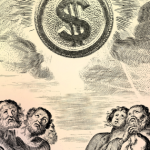This article was originally culled from the March edition of God, Man & Mammon: Navigating the tension between the material and the spiritual, Volume V by Mitch Anthony.
Now the Pharisees, who were lovers of money, also heard all these things, and they derided Him. And he said to them, “You are those who justify yourselves before men, but God knows your hearts.
For what is highly esteemed among men is an abomination in the sight of God.”
— Luke 16:13–15, NKJV
A Message from Money
Let’s put away pretenses and simply face the facts. I can make you more attractive. I can make people like you, want to be around you, and hang on every word you speak. I can make you the focus and locus of every conversation—because I have the power to make you sound impressive, even when you’re not. I can put you in a place where you don’t have to kiss up to anyone to get what you want. You can just be who you are with no
apologies, no polite little games of pretending to like people you
detest—no more suffering idiots at every turn. I can put you in control of your own destiny and get exactly what you want when you want it. Deny nothing to yourself and get what you deserve. You know how important I am. You think about me more than you care to admit. I see you cozying up to me, maneuvering to get closer, hoping to get more of me in your life, because you know I can make things better. I am money.
Let’s put away pretenses and simply face the facts. I can make you more attractive. I can make people like you, want to be around you, and hang on every word you speak. I can make you the focus and locus of every conversation—because I have the power to make you sound impressive, even when you’re not. I can put you in a place where you don’t have to kiss up to anyone to get what you want. You can just be who you are with no
apologies, no polite little games of pretending to like people you
detest—no more suffering idiots at every turn. I can put you in control of your own destiny and get exactly what you want when you want it. Deny nothing to yourself and get what you deserve. You know how important I am. You think about me more than you care to admit. I see you cozying up to me, maneuvering to get closer, hoping to get more of me in your life,
because you know I can make things better. I am money.
A Message from God
For of this you can be sure: No immoral, impure or greedy person
—such a person is an idolater—has any inheritance in the kingdom of Christ and of God
— Ephesians 5:5, NIV.
Our culture worships the acquisition of money. Society measures us by our capacity for gathering wealth. Is not the fact that people’s net worth is measured in dollars evidence enough? The late financial philosopher Richard Wagner describes the matter succinctly when he says, “Money is the secular god.” If we are not genuinely worshipping the one, true God with our life and behavior, we open ourselves up to worshipping the dollar either by design, or unwittingly.
This worship dilemma is a dichotomy––an either/or proposition––and Jesus taught it as such. Like the Pharisees, who were lovers of money, many claim to worship God but their conduct indicates their worship of money. Jesus called out religious leaders for this hypocrisy and it was this accusation of money worship that fueled their ire and determination to seek his death. If money was powerful enough to drive religious leaders to kill history’s best man, then we would all do well to keep our eyes open toward the many temptations money brings to our door.
Ponder your own personal walk of faith and the state of your relationship to God. If you are convinced of your belief in God, you attempt to devote your life to him, to the best of your ability. You strive to align every aspect of your life with the guiding principles that God offers. Our ultimate goal, as a believer, is to forge a lifestyle that is an actual form of worship.
The disciples of money also practice the alignment of belief and behavior. Their faith is firm and settled, being duly convinced that money is king. They are sure that money can give them everything they want and need. The disciples of the money god manipulate and strive for more because the success books say they should do so. Money becomes the overarching criteria when making all decisions. The investment gurus emphasize this point. The endless fretting about money is fueled by their holy tomes––the daily financial periodicals––which provide fresh and current reasoning to their fears. The money god acolytes are believers because they know that the golden rule in society is that “he who has the gold makes the rules.” It is no accident of language that our culture refers to money as the ‘almighty dollar.’
Ayn Rand’s classic Atlas Shrugged took the worship of the material to new levels of self-absorption with the promotion of the philosophy of objectivism––tied to capitalistic pursuit as the American ideal. The ideal of objectivism, when all the high-mindedness and pseudo-nobility is stripped away, is nothing more than self-interest dressed up in a tuxedo, driven by the tacit maxim, “Whatever I do to get more is OK because at the end of the day, it serves the greater good.” It is a dangerous idea, and I have viewed
firsthand the harsh personal and business realities that are often forged from this philosophy. Exploitive personalities don’t really need high-minded reasoning to affirm their use and disposal of others as they build their personal fortunes, but in Rand’s work they find it.
I find it fascinating that Napolean Hill’s bestseller, Think and Grow Rich, first published in 1937, is still popular today. Hill is credited for launching the “self-help” industry. This book has become a sort of worship manual for the acquisitive. He wrote inspiring words like, “Desire is the starting point of all achievement, not a hope, not a wish, but a keen pulsating desire which transcends everything.” Great words, but if the context is “getting rich”, then the words take on an altogether different meaning––a meaning that steers the reader toward material idolatry. Hill’s overarching idea was: You inculcate yourself in a manner where cashing in on an opportunity comes to dominate your thinking, and then money making opportunities begin appearing, because your mind is open and receptive. This sounds eerily like a blueprint for obsession.
I often ask young, ambitious individuals in the business world what they are reading and frequently hear, Think and Grow Rich. I always warn them to be careful, and they look at me with an eye of peculiarity. I explain to them that: 1) having eyes open to opportunity and 2) seeking to cash in at every turn—though just a step apart—are a dangerous coupling of ideas.
One idea can help them, and the other can destroy them. While awareness of possibilities and harvesting opportunities are good occupational habits to form, this awareness and lifestyle, for many, gradually morphs into obsession. They become money minded. Their life becomes a presentation of the appearance of wealth. Money-mindedness can be reduced to some very basic commandments. These commandments are a script for those who open the door to the money god. Following are three “Thou Shalt” Commandments guiding the money-centered life:
I. Thou shalt fawn over the Rich.
II. Thou shalt drive your child to become rich.
III. Thou shalt appear richer than you are
In this issue I’ll deal with the first commandment regarding fawning over the rich, and tackle the second and third in the next installment.
THE FIRST COMMANDMENT: THOU SHALT FAWN OVER THE RICH
My dear friends, don’t let public opinion influence how you live out your glorious, Christ-originated faith. If a man enters your church wearing an expensive suit, and a street person wearing rags comes in right after him, and you say to the man in the suit, “Sit here, sir; this is the best seat in the house!” and either ignore the street person or say, “Better sit here in the back row,” haven’t you segregated God’s children and proved that you are judges who can’t be trusted?
— James 2:1-3, MSG
James, the half-brother of Jesus, gives a powerful warning to early churchgoers against being swayed by appearances. Socio-economic bias in church society is forbidden, but proliferates nonetheless. In this respect, church society seems to have been swallowed up in society at large where sycophants abound. Pandering to those with wealth is a prejudice that permeates every corner of our culture–– where the seekers look past their glaring flaws in hopes of finding space in their good graces.
Royals often visit the city where I live. They fly in on their private royal jets, rent whole fleets of limousines and entire floors of the top hotels. They sometimes liquidate inventories in shops (one shop owner told me about a $1 million sale to one wealthy princess). They eat in the best restaurants, tipping handsomely. When they arrive, the local newspaper journals their appearances and economic impact. The entire city fawns over them and curries their favor. But in the hospitality backrooms, it is common knowledge that more than a few are rude, sexist, exploitive, and demeaning. One night my wife and I were at a restaurant and the manager came over to chat with us. During our conversation, the manager pointed out a particular prince sitting at the bar with two bodyguard-type attendants and, what appeared to be, two “body-pleasure”-type attendants. This manager said, “I can’t stand when this prince and his entourage comes in here. They offer the most disgusting propositions to my help, like, ‘Here’s $50 to sleep with me.’ They are amazingly condescending and rude, but boy, do they throw the money around when they’re here.” Two days later I saw a quote in the newspaper by the same manager about what “wonderful customers” the royalty were. No doubt you can get away with a lot of bad behavior when you’re “filthy rich.”
The rules of the game seem to be:
I. If you are rich, act with impunity. Do and say whatever you like because everyone feels they have to act as if they like you. II. Fawn over the rich so they will spend their money with you.
This may be a reason why so many want to be rich––or at least appear to be so. People will bend over backward for them. Somehow these individuals are worthy because they are rich. We are culturally obsessed and fixated upon “richness.” Search the nonfiction books under the category of business and investing at Amazon.com using the keyword “rich”, and you will find over 50,000 books to choose from. Search Amazon books on generosity” and you will find less than 50 choices. Search magazines with the keyword “money” and you will find 47 options. Search the “money”
books at Christian book distributors online and you will find 780 titles. Search “How to marry rich” and you will come up with 111 options. A popular expert in this arena is Ginnie Sayles, who has been interviewed by Oprah, Forbes, CNN, and The New York Times. She is the author of How to Meet the Rich: For Business, Friendship, or Romance. Sayles offers
seminars around the country on marrying rich ($50 to $150 a person), as well as $500/hour private sessions. If you can’t afford her personal coaching, you can simply study her books or buy the seminar on DVD. Sayles uses a 14-point system to help the “hoi polloi” ramp up their classiness. She claims that in over 20 years in business, several of her clients have married multimillionaires.
The bottom line is that the bottom line is the bottom line for money worshippers. They will play whatever game they find necessary to get nearer to those with money. The strategy for the Fawn-artist is this: tell them they’re great, pander to their every whim, crawl for their business, and honor them simply because they are wealthy.
The Kingdom of God on the other hand turns this pattern inside out. For the King himself shall say in the end, “Truly I tell you, whatever you did for one of the least of these brothers and sisters of mine, you did for me.” (Matthew 25:40 NIV) Earthly net worth will make no difference in how and where we point our affections on that day.









